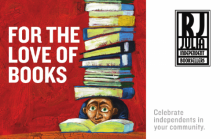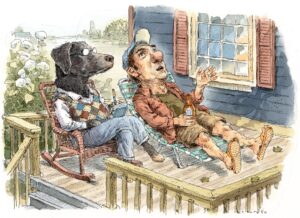Publishing Talks: Interview with Roxanne Coady of R.J. Julia Booksellers
June 17, 2021 by David
Filed under PublishingTalks, The Future
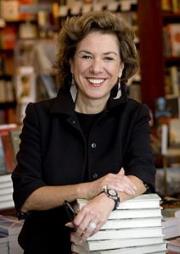 Publishing Talks began as a series of conversations with book industry professionals and others involved in media and technology, mostly talking about the future of publishing, books, and culture. I’ve spent time talking with people in the book industry about how publishing is evolving in the context of technology, culture, and economics.
Publishing Talks began as a series of conversations with book industry professionals and others involved in media and technology, mostly talking about the future of publishing, books, and culture. I’ve spent time talking with people in the book industry about how publishing is evolving in the context of technology, culture, and economics.
Some time ago, this series broadened to include conversations that go beyond the future of publishing. In an effort to document the literary world, I’ve talked with a variety of editors, publishers, booksellers, and others who have been innovators and leaders in independent publishing in the past and in the present.
These conversations have been inspirational to me on many levels. I have gotten to speak with visionaries and entrepreneurs, as well as editors and publishers who have influenced and changed contemporary literature and culture. I’ve also had the opportunity to speak with a number of friends and colleagues I have known over the many years I have been in the book business.
Bookstores have been an essential part of my entire life, even from early childhood, one benefit of growing up with a writer as father. Independent bookselling thrived from the late seventies into the late 1990’s, no doubt reflecting the Baby Boomer generation’s enthusiasm for books and ideas. The last twenty or more years have been very different, and now there are far fewer communities that support bookstores than at anytime in the past fifty years. Bookstores (along with public libraries) are a crucial element of a healthy culture, far more valuable than their size and scope would suggest. Local communities benefit from the presence of bookstores in many ways, and literary culture needs them too, as visible representations of a reading culture. Ideas grow and spread from books, but culture is also built around physically being present with one another.
So it is important for us to find ways as readers and literary citizens, to support bookstores, and it is equally important for booksellers to locate themselves, create and support communities around their stores, to support their workers and to make themselves meaningful enough to be thrive, despite the challenges of being small businesses in a mass-oriented consumer culture.
There are quite a few examples of booksellers who have made just such an impact, and their experiences and ideas are important for all of us to share and understand. It has been a particular pleasure for me to have known and worked with Roxanne Coady, the founder and owner of the exceptional R.J. Julia Booksellers, in Madison, Connecticut. We first met when Roxanne came to Connecticut to establish her new business after pursuing a successful career as a CPA in New York City. Over the years, I have spent many hours browsing their shelves, attending author events, and enjoying the cafe.
R.J. Julia has thrived during the period when local bookselling has faced an array of challenges, first from chain bookstores, then from Amazon and the rise of online retailing, and of course most recently, the pandemic. Throughout this time, Roxanne and her staff have innovated on many levels, including creating a drive-by pickup window for busy parents, putting on over 300 events a year (some of which are with celebrity authors), establishing an active email newsletter, providing online sales with speedy service, podcasting, and building an active book club. Throughout, the emphasis on community, care for staff as individuals, and listening to customers have been paramount characteristics of the enterprise. There is a bit of practical magic at work there, I think.
After more than 30 years of hard work and success, it’s obvious that Roxanne has quite a bit to say about what it takes to be a successful bookseller, to be a locally based business, and to be a crucial part of literary culture. I believe that our conversation should be meaningful for anyone interested in the future success of bookstores and the importance of building a real literary culture within a society that does not put enough value on books, authors, writing.
We need more bookstores! Visit the R.J. Julia Bookseller website and sign up for their newsletter.
Podcast: Play in new window | Download
Publisher and editor John O’Brien has died
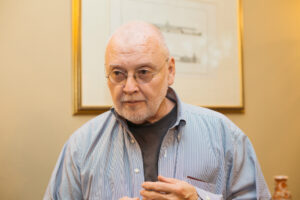 Old friend and colleague John O’Brien, founder of Review of Contemporary Fiction and Dalkey Archive Press passed away on November 21st.
Old friend and colleague John O’Brien, founder of Review of Contemporary Fiction and Dalkey Archive Press passed away on November 21st.
John and I had many mutual friends in literature and similar tastes and interests, and his vision of writing and books led me to learn about many writers whose work I would otherwise never have known. He was opinionated and sometimes difficult, but his dedication and commitment to discovering and presenting important books never wavered.
Here’s a good representation of his view of the work he did:
So I started the Review out of a sense of isolation, as well as a kind of outrage at the fact that books and authors were reduced only to marketplace value. And I should say that, from the start, I wanted the magazine to break down the artificial barriers that exist among countries and cultures. It was my view then and now that one can’t properly come to terms with contemporary writing without seeing it in an international context, and it’s also my view that Americans generally don’t want to know anything about the world outside the United States unless they are planning a vacation.
I interviewed John in 2016 for my Publishing Talks series of conversations with independent editors and publishers. We had a long and wide ranging conversation about the history of both his journal and his book publishing efforts.
In the description of that interview I quoted him: “I wanted the Press to define the contemporary period, or at least what I saw as what was most important in the contemporary period. Further, I wanted these books permanently protected, which is why from the start the Press has kept all of its fiction in print, regardless of sales. And as with the Review, I wanted the books to represent what was happening around the world rather than more or less being confined to the United States. Like the Review, Dalkey Archive Press was and is a hopelessly quixotic venture.”
In 2011, Dalkey Archive received a Lifetime Achievement Award from the National Book Critics Circle, and in 2015 John O’Brien was made a knight in the Orde des Arts et des Lettres for his contributions to publishing French literature abroad. Not bad for such a “hopelessly quixotic” operation. The catalog of Dalkey is massive and is a remarkable testament to the talent, taste and energy John brought to his work and life.
The latest news is from Deep Vellum, which has acquired Dalked and RCF:
Before his passing, the Dalkey Archive’s board of directors approved an agreement to merge with Deep Vellum Publishing, a nonprofit publishing house and literary arts center based in Dallas, TX. Deep Vellum and its publisher Will Evans plan to honor John O’Brien’s legacy by keeping Dalkey Archive’s backlist in print and by signing future titles, together with the assistance of editorial consultant, Chad W. Post, of Open Letter Books at the University of Rochester.
As an editorial imprint of Deep Vellum, Dalkey Archive will remain true to O’Brien’s vision of keeping its legendary backlist in stock, continuing to publish leading literature from around the world, and working closely with readers, students, editors, writers, and translators to foster an international community for literature. Will O’Brien, John’s son and current president of Dalkey Archive’s board of directors, will join Deep Vellum’s board of directors as part of the merger.
An online memorial service to honor John O’Brien’s life and work will be held on December 9th. Keep up with Deep Vellum here.

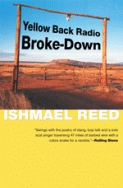
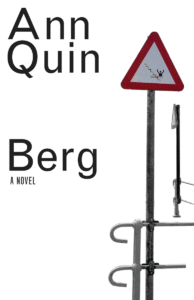
Blackwood: A Novel by Michael Farris Smith
August 14, 2020 by David
Filed under Fiction, WritersCast
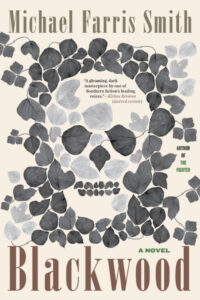 Blackwood: A Novel – Michael Farris Smith – 9780316529815 – Little Brown – Hardcover – 256 pages – March 3, 2020 – $27.00 – ebook versions for sale at lower prices
Blackwood: A Novel – Michael Farris Smith – 9780316529815 – Little Brown – Hardcover – 256 pages – March 3, 2020 – $27.00 – ebook versions for sale at lower prices
This is pretty much a stunningly written book. I discovered the writing of Michael Farris Smith serendipitously through the southern culture magazine, Garden & Gun. I read a short piece they published called “How a Steadfast Pup Helped an Author Find His Voice,” which is just a fantastic work of personal memoir. That one essay prompted me to learn about Smith and to get a copy of his latest book. Yes, this is how literary discovery works today. There are so many good writers in the world, and we are blessed with a plethora of books to read. But at the same time, how do we find out about them? I had not heard of Michael Farris Smith before. Blackwood is his fifth book, and his work has been well reviewed and praised by writers whose opinions I respect. I was surprised I had never run across his work before, and pleased I did.
I started reading Blackwood without knowing very much about this writer or his past work, or the kinds of stories he tells. There is no doubt that Blackwood can be pretty dark at times – funnily, it reminded me of the great Netflix series, Stranger Things – though much more powerful in the way that only fiction can convey mystery. It can be scary at times, and there are characters in this book who are just terrible, dangerous figures. I don’t think you have to be a southerner or to have lived in the south at all to appreciate this book, or the kinds of people who inhabit the fictional Red Bluff, Mississippi, but it helps, I am sure, as the landscape and the mysteries Smith explores are very much “of the South” and the pain and suffering that resides in its countryside. That suffering is an integral element of the history of the people and the land that is palpable in this novel. The collection of characters is interestingly diverse, combining a bit of Faulkner with a touch of Stephen King, it seems.
I tend to think of this book as a novel of magical realism that taps into a mysterious darkness that inhabits the land itself. It is chthonic – almost literally. There is a part of this novel that is mythic, subliminal, deeply psychic in a wounded way, and the people who live in this strange place have become part of the mystery and part of the land as well. I wondered at times if Smith is telling a story that even he may not fully understand, almost like a Druid priest channeling voices from another reality. The book is very powerful, and that power makes it difficult sometimes to get your bearings, as a reader, you can feel outside the realm of your own experience enough that you must allow Smith’s language to transport you to this other place, and dream alongside and almost within the author’s psyche.
Some of the words used by reviewers come to mind – “brutal,” “supernatural,” “startling,”. All are accurate. I felt the pain of this novel deeply. And yes, it is a southern novel, but that should not ever be considered a limitation. This is just a great novel that happens to be set in the south.
I am really pleased that I discovered Blackwood and the work of this compelling writer, Michael Farris Smith. I’d like to especially thank the magazine Garden & Gun for doing what they do so well — exploring and expounding on modern southern culture. And thanks to Michael Farris Smith for taking the risk to write this difficult book, and for talking to me about it. We had a great conversation together.
“Lurking over Blackwood is a family of itinerant grifters—a version of Faulkner’s Snopes clan, forces of chaos, human kudzu except for the youngest of them, a mysterious boy in whom Colburn sees his young self. As in the best noir, A soul-strangling inevitability hangs over Red Bluff, yet somehow Smith gives his doomed characters a dignity in the face of forces well beyond their control.” Booklist (starred review)
Michael Farris Smith website.
Buy the book at RJ Julia Booksellers.
Podcast: Play in new window | Download
Naomi Shulman: Be Kind: You Can Make the World a Happier Place!
March 31, 2020 by David
Filed under Children's Authors, WritersCast
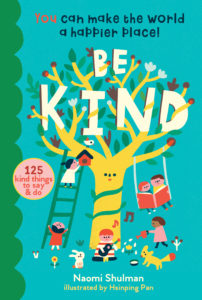 Be Kind: You Can Make the World a Happier Place! 125 Kind Things to Say & Do – Naomi Shulman – Illustrated by Hsinping Pan – Storey Publishing – 9781635861549 – Hardcover – $12.99 – June 25, 2019 – ebooks available at lower prices.
Be Kind: You Can Make the World a Happier Place! 125 Kind Things to Say & Do – Naomi Shulman – Illustrated by Hsinping Pan – Storey Publishing – 9781635861549 – Hardcover – $12.99 – June 25, 2019 – ebooks available at lower prices.
I learned about Naomi Shulman because of something she wrote a few years ago that has circulated widely. What she said resonated with my own thinking about our responsibilities as citizens:
“Nice people made the best Nazis. My mom grew up next to them. They got along, refused to make waves, looked the other way when things got ugly and focused on happier things than “politics.” They were lovely people who turned their heads as their neighbors were dragged away. You know who weren’t nice people? Resisters.”
So I went in search of Naomi Shulman online, feeling like this would be someone I’d be really interested in talking to. I discovered she has also written this wonderful kids’ book, Be Kind, and was very happy to set up a chance to talk with her about this book and her thinking about the world. One thing we did address is the big difference between being nice and being kind.
Kindness seems like such a simple thing. But it really isn’t. Kindness requires empathy, connection with others, and being genuinely other directed. Kindness is something we all appreciate but recognize as not being generally practiced by so many of our fellow human beings and planetary citizens. Kindness is not passive either, as Naomi points out.
Be Kind helps parents and children aged 5 and up learn some simple, action-oriented things they can do in their daily lives to help them become active practitioners of kindness and love.
Naomi teaches kids that kindness is much more than being “nice,” to others. Some of the things she demonstrates include standing up for someone or something, engaging in a community, showing compassion toward others (beings as well as humans), and expressing gratitude. The illustrations by Hsinping Pan are absolutely perfect, as is Naomi’s writing. Though it’s small book, there are 125 concrete activities kids and their families can pick and choose from and act out. You can be the first person to say good morning to a friend, or pay someone a compliment, help elderly neighbors with chores, maybe just learning to say hello to an immigrant in their own language, or just sending a card to someone for no particular occasion.
Be Kind empowers kids to make the world a better, kinder place, and that is nothing but a good thing. I talked to Naomi about the book, her philosophy of living and teaching, and all sorts of things relating to politics and culture. It was a fun conversation for me, and I hope one that will help all of us during this particularly challenging time.
Being kind will help us get through the difficulties of daily life. And that includes being kind to ourselves.
Be Kind was a 2019 Mom’s Choice Award Gold Winner
“Be Kind is a lovely reminder that every moment can be filled with a thoughtful act of kindness. This beautifully illustrated book gives fresh and meaningful ways that each child — and adult — can make our world a happier place and prove that KINDNESS MATTERS!” — Jill McManigal, cofounder & executive director, Kids for Peace and The Great Kindness Challenge
Naomi Shulman lives with her daughters in Northampton, Massachusetts. She’s now a writer and editor, formerly having worked in book publishing at St. Martin’s Press, and was the research editor at Wondertime, a Disney parenting magazine. As a freelancer, she has worked in memoir, fantasy, literary fiction, mysteries, sci-fi and children’s books.
You can support local bookselling, which needs your support, by purchasing Be Kind from RJ Julia Booksellers in Madison, Connecticut. They fill online orders quickly – click here to order.
More of Naomi’s work can be found here.
Podcast: Play in new window | Download
Maureen Owen and Barbara Henning reading in Tucson, Arizona
March 3, 2019 by David
Filed under AuthorsVoices
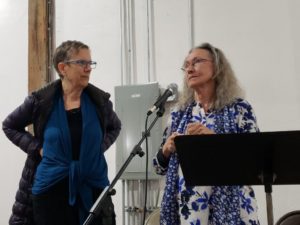 What a great trip! Starting January 18, 2019, with a reading at McNally Jackson Bookstore in Brooklyn, New York, poets Maureen Owen and Barbara Henning, started a cross country journey together (you can view their trip itinerary here).
What a great trip! Starting January 18, 2019, with a reading at McNally Jackson Bookstore in Brooklyn, New York, poets Maureen Owen and Barbara Henning, started a cross country journey together (you can view their trip itinerary here).
Appropriately, their story and journey began in Brooklyn, where Barbara lives, and this amazing cross-country jaunt ends in Denver two months later, where Maureen lives.
The two writers have been blogging about their adventure here – their writing is terrific and fun, it is always fresh and lively, truly poets’ reportage, and reading their travel log will make you feel like you are along for the ride with them. They are having alot of fun and meeting and talking with some wonderful people along the way. They are getting to see some beautiful parts of our country too. Their two months on the road will feature 16 public events, and innumerable anecdotes and stories. It’s really fun to follow along with them as they travel, and when they are done, this will make a really interesting book.
I had the good fortune to be in Tucson, Arizona, when the two writers arrived there on February 14. Maureen is an old friend and colleague, so it was wonderful to get together with her, and to meet Barbara for the first time. When I went to hear them read for the POG Poetry reading series at the Steinfeld Warehouse Community Art Center, 101 West 6th Tucson on Saturday, February 16, and I recorded the event for this Authors Voices series here on Writerscast.
Local writer Steve Salmoni introduced the event. Poet and publisher (Chax Press) Charles Alexander introduced Maureen, and artist Cynthia Miller introduced Barbara, who lived in Tucson for a few years and has many friends there still.
It was a great event, and a wonderful opportunity to hear two terrific writers, both of whom engage with their audience and their writing. I’ve known Maureen for a long time, and believe she is one of the best poets of our time. Getting to hear Barbara Henning was a treat for me, as she is also a terrific writer of both poetry and fiction. I’m very pleased to have the opportunity to present this reading here.
Poet Maureen Owen was born in Minnesota, lived and worked in New York City and Connecticut, and has been living in Denver for a number of years, where she has long taught at nearby Naropa University. She was the founder of Telephone magazine and Telephone Books, worked at the Poetry Project in NYC, and is the author of a number of wonderful collections of poems.
Barbara Henning is a poet and fiction writer, born in Detroit, who has lived mostly in New York and Tucson since the early eighties. Aside from being the author of a number of books of poetry and fiction, she was also the editor of a book of interviews, Looking Up Harryette Mullen, and The Selected Prose of Bobbie Louise Hawkins. She is professor emeritus at Long Island University, where she taught for many years.
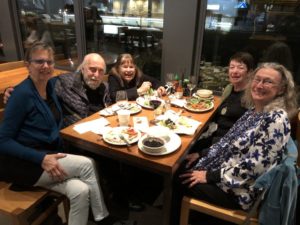
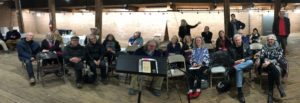
Podcast: Play in new window | Download
Publishing Talks: David Wilk interviews Dan Blank of We Grow Media
December 16, 2018 by David
Filed under Ebooks and Digital Publishing, PublishingTalks, The Future
 Publishing Talks began as a series of conversations with book industry professionals and folks active in media and technology, at that time, mostly talking about the future of publishing, books and culture. At the outset of this series, I was mostly interested in exploring what people were thinking about the changing economics and culture of publishing and reading.
Publishing Talks began as a series of conversations with book industry professionals and folks active in media and technology, at that time, mostly talking about the future of publishing, books and culture. At the outset of this series, I was mostly interested in exploring what people were thinking about the changing economics and culture of publishing and reading.
Now, I’ve expanded these talks to go beyond the future of publishing – in some cases, by going backwards to discuss the recent history of publishing, and in some instances, sideways into various other realms that interest me. I’ve talked with editors and publishers who have been innovators and leaders in independent publishing in the past, and into the present, and will continue to explore the ebb and flow of writing, books, and publishing in to document the cultural milieu around books, authors and publishers.
Dan Blank is an inspiring and practical thinker about books, authors and readers. We met a number of years ago, and in working with him on a project to help self publishing authors, I was impressed with his thinking and ideas for ways to help writers conceptualize marketing. I first talked to him for Publishing Talks all the way back in 2012 – you can listen to that interview here. I have continued to follow his work through his excellent email newsletter, and frequently, have been inspired by his writing, especially his view of how writers can thrive in a challenging environment. Since so much has changed in the publishing landscape over the past several years, I thought it would be valuable to talk to Dan again about his current work with writers, books, readers, and the way they are connected.
Dan did not disappoint. This interview is full of great advice for writers and anyone who is interested in connecting with audiences in today’s media-rich environment.
As Dan says about himself on his website, he “help(s) writers and creative professionals share their stories and connect with their audience.” He’s worked with hundreds of authors and many publishers as well. And he has written his own book too, making the process of writing and publishing the book part of his experience-based coaching – Be the Gateway: A Practical Guide to Sharing Your Work and Engaging an Audience.
Dan’s website, wegrowmedia.com is well worth spending some time with, and his newsletter has been a valuable source of ideas and inspiration to many.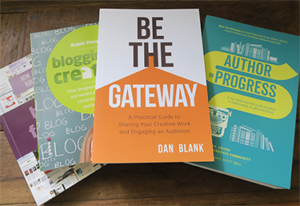
Podcast: Play in new window | Download
Joanna Cantor: Alternative Remedies for Loss (A Novel)
July 31, 2018 by David
Filed under Fiction, WritersCast
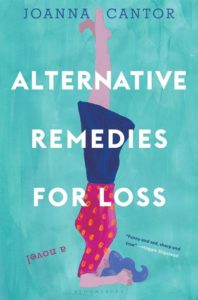 Alternative Remedies for Loss – Joanna Cantor – Bloomsbury – Hardcover – 9781635571714 – 320 pages – $26.00 – May 8, 2018 – ebook editions available at lower prices. Paperback comes out
Alternative Remedies for Loss – Joanna Cantor – Bloomsbury – Hardcover – 9781635571714 – 320 pages – $26.00 – May 8, 2018 – ebook editions available at lower prices. Paperback comes out
One of the great things for me about doing this podcast is that I have been introduced to such a varied range of books and writers. When I started this series, my intention was primarily to make myself a more regular reader. Like so many other people, I have found the intrusion of devices and media of all kinds distracting (in an enjoyable way for the most part), taking so much of my time away from the pure pleasure of reading, that I thought a regular schedule of talking to writers about their books would give me the discipline I generally lack, and make certain that I both read more books, and think more reflectively about what I read.
In many ways, of course, that intention has succeeded. But one of the surprises for me in this process has been that so many publishers and authors have approached me to read and interview an amazingly wide range of books. I have done my best to read books that are outside my “normal” range of interests. And that has been incredibly rewarding. Today’s interview, with the author of Alternative Remedies for Loss demonstrates one of those enjoyable discoveries that being a book podcaster has enabled.
Joanna’s story revolves around Olivia, who leaves her senior year at college to be with her mother through her terminal illness. The through line of the book is Olivia’s effort to cope with this unexpected loss. She takes a job in media in New York City in a sort of dazed state, and while it appears the rest of her family is moving on with their lives, Olivia cannot quite figure out what is going on now. Then she accidentally discovers that her mother might have been involved with a man other than Olivia’s father, and this emotional shock triggers Olivia’s quest to more fully understand her mother, come to terms with her own self in the world, and essentially to work through the emotions that are blocking her from being at peace.
There’s a great energy to this book, and because the writing is so good, the characters believable and fully formed, it is easy to get wrapped up in Olivia’s effort to become a fully formed human being in challenging emotional circumstances, perhaps her first in a fairly privileged upper middle class upbringing that many readers will recognize, and perhaps identify with themselves. Author Cantor refuses to whitewash her main character and gives her flaws and weaknesses that bring her to life. A good novel solves problems we sometimes did not realize we were able to engage with, and this one does that for me – I am glad to have had the chance to engage with Olivia’s story, and it was a pleasure to meet and speak with Joanna.
Joanna Cantor is a very talented writer. She lives in Brooklyn, teaches yoga and continues to write fiction. I really enjoyed reading this book and talking to her about writing, first novels, and of course, this book.
Joanna Cantor’s website is worth a visit.
(Production note: in doing this interview, I had a problem with the recording device, and we had to finish the conversation by phone, so you will notice some variations in the sound during the course of this particular podcast. I’ve got a new recording device now and hope to avoid problems like this in the future.)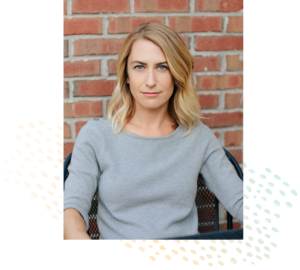
Podcast: Play in new window | Download
Jonathan Lerner: Swords in the Hands of Children
October 30, 2017 by David
Filed under Non-Fiction, WritersCast
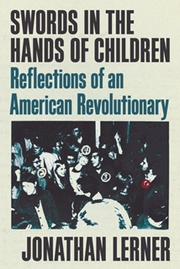 Swords in the Hands of Children: Reflections of an American Revolutionary – Jonathan Lerner – OR Books – Hardcover – 9781944869472 – $22 – 224 pages – December 5, 2017. Ebook versions available at a lower price. Order direct from the publisher, OR Books.
Swords in the Hands of Children: Reflections of an American Revolutionary – Jonathan Lerner – OR Books – Hardcover – 9781944869472 – $22 – 224 pages – December 5, 2017. Ebook versions available at a lower price. Order direct from the publisher, OR Books.
As Writerscast listeners doubtless know, I am interested in books about the sixties, a period in our history that shaped so much of what is now our current worldview and world situation, for better and for worse. This was a period in American history marked by social and political conflict, sparked principally by the Vietnam War. For many young people, it was the time in their lives when political and social idealism flourished, yet for some, directions taken and decisions made, acts committed, that would later appear misguided and wrong.
In the early sixties, Jonathan Lerner was a student at Antioch College, who almost accidentally became a full-time staff member of Students for a Democratic Society, the most powerful organization of the New Left (among its founders, the recently deceased Tom Hayden). In this book, Jonathan recounts the story of his life during the most fraught years of the political upheavals of this era.
Jonathan Lerner was at the center of many of the most important political events of that time. He became a founding member of the Weatherman faction of SDS, which ended up taking over the organization in 1969, and was the editor of its newspaper Fire! and an “above ground” representative of the Weather Underground organization, that was responsible for much of the far left spawned violence of the era.
The Weather Underground ultimately carried out a campaign of bombings across America. Some of its members died, many stayed underground for years, and some went to jail. Lerner tells some compelling stories about this time in particular and the people he worked and lived with. Overall, he seems to have been almost an accidental radical, who like many in the sixties, “went with the flow” of events and people around him, trying to find his place in a complicated environment.
Jonathan tells his story with brutal honesty, questioning much of what he once took for granted, as an insecure gay man existing in an environment that was not supportive in any way. This memoir has much to offer to those of us still seeking to understand the politics and culture of our youth, as well as for those too young to have experienced the sixties directly.
Lerner is the author of the novels Caught in a Still Place and Alex Underground, and is today a journalist focusing on architectural, urbanist and environmental issues. He lives in the Hudson Valley of New York state with his husband.
We had a great conversation in our wide ranging conversation. Visit Jonathan’s website here.
“Imagine if your favorite uncle, a brutally honest, worldly, self-reflective gay raconteur, had been, as a twenty year-old, a lieutenant in an underground guerrilla army dedicated to the violent overthrow of the government of the United States. Jonathan Lerner is that favorite uncle you never had, telling unbelievable true stories―no bullshit―from the ‘revolution’ fifty years ago. This is the closest you’ll ever get to being there.” ―Mark Rudd, national secretary of SDS, founding member of the Weather Underground and author of Underground: My Life with SDS and the Weathermen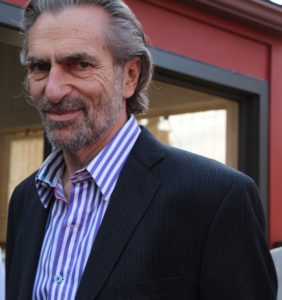
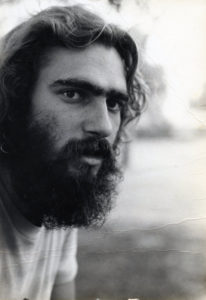
Podcast: Play in new window | Download
Nancy MacLean: Democracy in Chains: The Deep History of the Radical Right’s Stealth Plan for America
September 26, 2017 by David
Filed under Non-Fiction, WritersCast
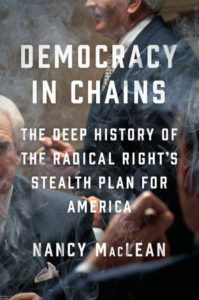 Democracy in Chains: The Deep History of the Radical Right’s Stealth Plan for America – Nancy MacLean – Viking – Hardcover – 9781101980965 – $28.00 – 368 pages – June 13, 2017
Democracy in Chains: The Deep History of the Radical Right’s Stealth Plan for America – Nancy MacLean – Viking – Hardcover – 9781101980965 – $28.00 – 368 pages – June 13, 2017
I will say this clearly and forthrightly: whatever your political opinions or positions, you must read this book. It shines an important light on the history of what has now become the most potent force in modern American politics. This book reveals in detail how the Koch brothers and other shadowy billionaires’ political philosophy has been weaponized in an ongoing war against democratic beliefs and institutions.
Professor MacLean came across this historical record more or less by accident, while she was researching the Nobel Prize-winning political economist, James McGill Buchanan, the principal architect of the ideas and institutions the Koch brothers and their allies have harnessed to radically alter the American political landscape in their distorted image of “economic libertarianism.” This philosophy fully recognizes that anti-democratic efforts are necessary to secure the wealth of the few against the “predations” of the democratic majority, and all their work for the last forty years or more has been aimed toward controlling and weakening democratic institutions. They have been remarkably successful in their efforts.
There is so much to learn in this book, yet still so much more for us to uncover, and ultimately then, so much that needs to be done by those who feel the need to defend democratic liberalism and American institutions. It is remarkable to learn that this effort is essentially part of a longstanding effort to reach far back into our history to undo FDR’s democratic reforms, as well as those of JFK, LBJ, and the civil rights movement. And that Charles Koch is so ironically a follower of the principles of that old Bolshevik, V.I. Lenin.
We learn here that Koch and his cronies have built a secret cadre of true believers who want to do what their hero Buchanan did in Pinochet’s Chile, which was to use the institutions of government to control and contain democracy. They have come a long way toward succeeding in our own country, as most citizens are completely unaware of what they are doing, especially with their takeover of the judiciary. And in Trump’s America, they are free to have their way with us.
One way you can tell Nancy MacLean has made an impact with her research is the level and sheer ferocity of mostly personal attacks from the right against her. Those who post in opposition seem to have neither read the book, nor care to think about the author’s actual work. One of the tools used by the Koch-financed opponents of democracy is the personal attack and what they call the “increased transaction cost” for anyone who opposes their views. Since they usually cannot win intellectual or even political arguments, they prefer to disparage and attack those who dare stand against them on other grounds than reason.
I urge listeners to read this book, think about what MacLean has uncovered, and then, if you agree with what she says, use what you learn from this book to stand up for freedom and democracy against oligarchy.
“This sixty-year campaign to make libertarianism mainstream and eventually take the government itself is at the heart of Democracy in Chains. . . . [MacLean] takes the time to meticulously trace how we got here. . . . If you’re worried about what all this means for America’s future, you should be. . . . And if someone you know isn’t convinced, you have just the book to hand them.”
—NPR
“It’s the missing chapter: a key to understanding the politics of the past half century. To read Nancy MacLean’s new book, Democracy in Chains: The Deep History of the Radical Right’s Stealth Plan for America, is to see what was previously invisible.”
—George Monbiot, The Guardian
“[A] riveting, unsettling account of ‘Tennessee country boy’ James McGill Buchanan, key architect of today’s radical right.”
—O, The Oprah Magazine
Nancy MacLean is also the author of Behind the Mask of Chivalry (a New York Times “noteworthy” book of the year) and Freedom is Not Enough. She is currently the William Chafe Professor of History and Public Policy at Duke University, and lives in Durham, North Carolina.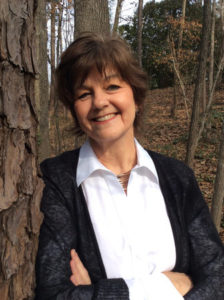
Podcast: Play in new window | Download
David Wilk interviews Joanna Penn of The Creative Penn
September 11, 2017 by David
Filed under Ebooks and Digital Publishing, PublishingTalks, The Future
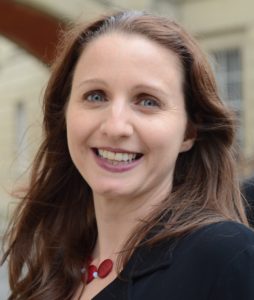 Publishing Talks began as a series of conversations with book industry professionals and others involved in media and technology, mostly talking about the future of publishing, books, and culture. As every media business continues to experience disruption and change, I’ve been talking with some of the people involved in our industry about how publishing might evolve as it is affected by technology and the larger context of culture and economics.
Publishing Talks began as a series of conversations with book industry professionals and others involved in media and technology, mostly talking about the future of publishing, books, and culture. As every media business continues to experience disruption and change, I’ve been talking with some of the people involved in our industry about how publishing might evolve as it is affected by technology and the larger context of culture and economics.
I’ve now expanded this interview series to include conversations that go beyond the future of publishing. I’ve talked with editors and publishers who have been innovators and leaders in independent publishing in the past and into the present, and will continue to explore the ebb and flow of writing, books, and publishing in all sorts of forms and formats, as change continues to be the one constant we can count on.
The rise of self publishing authors is one of the most significant elements of change in the modern publishing landscape. Technology is one element – ebooks and digital short run printing (aka print on demand) give authors access to low cost production and distribution capabilities. The internet as a disseminator of information has helped to democratize publishing skills and knowledge, and generally to drive down the costs of production for books of all kinds. Disruption among traditional publishers has also helped by creating a large pool of experienced freelancers that can provide high level publishing services at reasonable cost.
And crucially, a large group of successful do-it-yourself publishing authors and publishing professionals have become teachers and guides, assisting writers at every level of experience, of every kind of writing, to themselves learn the ropes of what was once a somewhat esoteric set of skills and knowledge. And because change is such a prominent feature in the modern publishing environment, no author can afford to not be in a continual state of learning. The advisors, consultants and teachers who both know “how to do it” and how to keep learning have become tremendously important resources for a wide range of authors.
One of the best of the brightest of these is UK-based writer Joanna Penn. Her fantastic website, The Creative Penn, has become one of the largest of its kind in the literary world. Joanna is an award-winning, best-selling thriller writer and she writes really good nonfiction books for authors. She is now a publisher too (Curl Up Press), a speaker, and of course, an entrepreneur. She’s endlessly energetic, smart, perceptive, and gives consistently great advice. I am a regular reader of her work, and refer to it frequently on the self publishing blog I operate myself.
I could not pass up the opportunity to speak with Joanna about her work as a writer and self publishing guide. It was great fun for me, and I am sure will be for my listeners as well. Even if you never self-publish your work, it is well worth hearing what she has to say. At least for me, the time flew by, and we could easily have talked much longer. Thank you Joanna!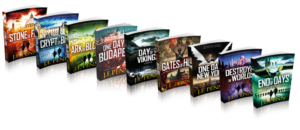

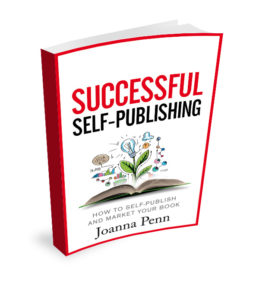
Podcast: Play in new window | Download

